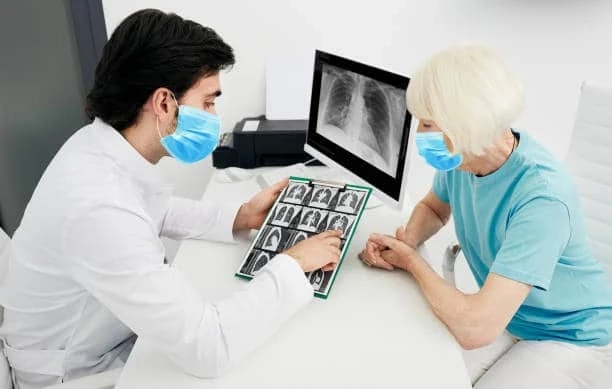For the last two years when the Covid wave surged through the world, everyone was concerned about how it is going to affect their health. This is when Pulmonologists were in high demand as one of the most affected health aspects of Covid was the respiratory system.
We can live a bit without water and food for some time, but we can’t live without inhaling oxygen. How our respiratory system works and efficiently functions is very important for our overall health.
Who is a Pulmonologist?
A pulmonologist is a medical professional who deals with everything related to the respiratory system. They diagnose and treat all the related conditions, like tuberculosis, asthma, and more, managing different types of respiratory orders such as:
- Inflammation
- Infection
- Structural Disorder
- Autoimmune Condition
- Neoplastic Condition (tumor related)
- And more
Pulmonologists in Noida, or anywhere else, manage, treat and cure every disorder related to the respiratory system, and some experts also extend their expertise to the cardiovascular system as well. Proper treatment of ailments affecting the respiratory system is important. If untreated, these disorders can go on and affect other areas of the body as well, negatively.
What Pulmonologists Cover in Treatment and Cure?
Pulmonologists precisely focus on the respiratory system that covers all the body organs or parts involved in the breathing process. This includes three system parts inclusive of lungs, airway, and respiratory muscles. In detail, the different body parts managed by the pulmonologists include:
- Mouth
- Nose
- Trachea or windpipe
- Larynx or voice box
- Pharynx or throat
- Bronchi (also known as passageways in the lungs)
- Bronchioles (small passageways in the lungs)
- Air sacs in the lungs, or alveoli
Talking about health disorders or conditions that pulmonologists treat, these include:
- Asthma
- Acute and chronic bronchitis (a condition of inflamed lower airways)
- Bronchiectasis (excess mucus and inflammation)
- Tuberculosis (an infection that affects the lungs)
- Chronic Obstructive Pulmonary Disease (COPD), also including Emphysema
- Occupational lung disease (respiratory disorder caused by consistent inhaling of chemicals, dusts or protein)
What Sub-specialities Do Pulmonologists Hold?
Some pulmonologists also extend their expertise to some sub-specialities that include:
- Breathing problem caused by sleep-disorder
- Interstitial lung disease (a condition that affects the tissue and space within the lungs)
- Obstruction or narrowing of the airway (also known as obstructive lung disease)
- Interventional pulmonology, which is related to disorders concerning airway issue, pleural disease and lung cancer
- Respiratory muscle failure, also known as neuromuscular disorders
- Lung transplantation (coupled with managing before and after surgery process)
What Symptoms Tell You to Visit and See a Pulmonologist?
Like any other health disorder, respiratory system ailment also comes with symptoms and signs that you should not overlook or ignore. After all, it is all about your breathing system, and maintaining it in the best shape and working finely is extremely important.
For basic or minor disorders, your primary care doctor or medical professional can provide you with assistance. But if the condition escalates and possesses a threat to your overall well-being, then they would refer you to the best pulmonologist in Noida or wherever you reside. These signs and symptoms include:
- Consistent problem in breathing
- Consistent and persistent coughing
- When you are wheezing
- Persistent coughing up of mucus or blood
- Unexpected weight loss
- Panting condition when exercising even for a short duration
- Experiencing breathing issues when taking to working out
- Smoking
What Procedures do Pulmonologists Follow to Treat & Cure Lung and Respiratory System Diseases?
Pulmonologists’ diagnosis and treatment process involve thorough exams and tests and full evaluation of the results that determine what health disorder the subject is suffering from and what treatment method is best suitable for curing the problem.
- CT Scan – A complete visual analysis of the muscles, bones, blood vessels, organs, and fat on and around the chest area.
- Pulmonary Function Test – Breathing test that evaluates how well the lungs are performing to breathe.
- Ultrasound – A full assessment of the organs and chest area’s other structures.
- Bronchoscopy – An assessment of the lung airway that helps to identify if there is any problem related with lower airways, windpipe, voice box or throat.
- Pleural Biopsy – Procedure for removal of tissue sample from the pleural for further study and examination.
- Pulse Oximetry Test – This identifies the oxygen saturation level in the blood.
- Sleep Study – Diagnose and determine if the subject is affected from sleep apnea and other such sleep disorders.
Conclusion:
Respiratory system conditions can be mild and temporary to acute, chronic and long lasting. Depending on that you should seek the medical assistance to get that treated and cure at the right time.
For mild conditions mild pneumonia or cold, your primary care doctor could help you with basic medication assistance. However, if the symptoms are severe or persistent then you need to visit good hospitals in Noida, or wherever you live, and seek medical assistance from a specialist pulmonologist.
0



